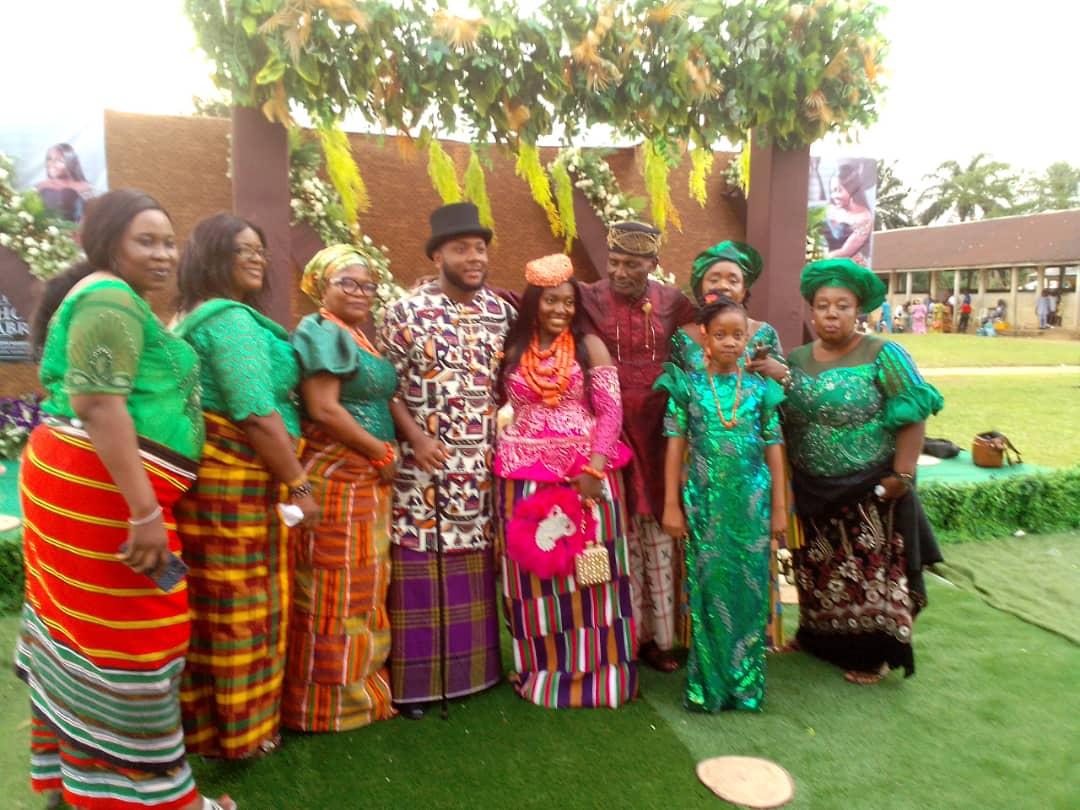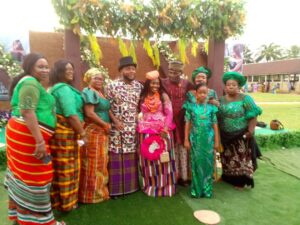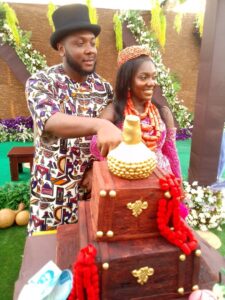Women
A New Dawn
Book Title: A New Dawn
In Abuloma Leadership
Author: Chief Joseph I. Orumo-Giali
No of Pages: 247
Publishers: Humtec, Printing/Publishing Coy (2017) Book Reviewer: Chief (Dr) Isaac Zeb-Obipi; Ogulacha II
Dean, Students Affairs, Rivers State
University
As people join organizations or groups, often existing relationships with members of the same group is deepened and new ones created; sometimes with persons one had not met before. This aptly describes my experience with members of the Abuloma Council of Chiefs when 1 became a member of the Okrika Divisional Council of Chiefs on the 28th of December, 2010, as Ogulacha II, Chief and Traditional Head of Ogulacha War Canoe House of Ogoloma.
One of the members of the Abuloma Council of Chiefs I have come to have a very close relationship with is Chief Joseph Igbikiminachiari Orumo-Giali, the author. I am not surprised that he chose me for this assignment given the unofficial status he has granted me as his adviser and moderator. Thus, I am very pleased to be part of this gathering at his instance and thankful for the opportunity to do the book review.
The work for review is a seven-chapter book with a preface, acknowledgement, dedication, forward and table of content. It also has footnotes, chapter notes, references and index. While the cover page has the logo of the Giali War Canoe House, on the back page is brief information about the author and the book. In the review, the following subheadings will be our guide in addition to this introduction and later, conclusion: a) Chapter Number, Title and Focus (b) Recorded Challenges and Successes of the Author (c) Author’s Selfless Service and Administrative Template (d) Historical Documents, Tables and Photos in the Book.
Chapter Number, Title And Focus
The author started the preface of the book with his reasons for writing the book, what informed the choice of the title, and what he intends the book to achieve before providing a chapter-by-chapter summary of the seven (7) chapter book. From the preface and forward, one can have an idea of not only numbers of the chapters but also the title and focus of each chapter. Chapter one is titled, from the Cradle, two, Abuloma as a Kingdom, Three, Amanyanabo Evolution and Resolution in Abuloma Kingdom, Four, Infrastructure Development. Five, Establishment of Abuloma Jetty. Six, Dedication of the Abuloma Community and introduction of Abuloma day and Seven, Resolution of the Ownership Rights of Mangroves and land tenure system in Abuloma.
Recorded Challenges And Successes Of The Author
In justifying writing the book, the author said the odds and challenges that he faced and successes he recorded partly propelled him to “put pen on paper”. So in the course of the review, we tried to find answers to the question: “What were those challenges and successes?” The work clearly spells out the recorded challenges and successes of the author, some of them being resolution of the Amanyanabo conflict, coronation of a King and the building of a new town hall, among many others.
Author’s Selfless Service And Administrative Template
Another factor that inspired the author is his “burning desire (Orumo) to serve, … redirect (his) good people of Abuloma … (into) a new dawn in the Abuloma leadership structure … (and) set a template for successful leadership in Abuloma Kingdom” (Giali, 2017: vii-viii). We were curious to find out how much of this the book conveys. Indeed we found sufficient indicators that his quest for leadership was for service and the book has set templates for successful leadership in Abuloma Kingdom.
Discussing the administrative organs of Abuloma, the book reveals how instrumental he was to setting resolutions to guide the administration of the youth council, community development committee and women forum (Giali, 2017: 48-50). The Abuloma Joint Council, under his leadership, passed and signed the said set of resolutions on 14th September, 2014; less than a year after his assumption of office as Chairman of the Council.
In his effort to “quench the Amayanaboship wrangling, the Chiefs Council under his leadership made several sacrifices and even “came up with the selfless idea that none of the incumbent chiefs of Abuloma … should be a candidate to the contest to the throne …so that they will be upright in their decision making (Giali, 2017: 138). Consistent with this line of selfless service, the author led a stool rotation selection system devoid of personal interest as his original War Canoe House (Ekpeli) and his new War Canoe House (Giali) are the last to ascend the throne (Giali, 2017: 154-159). The stool rotation system put in place is indeed a template that would reduce future leadership disputes in the administration of the community.
The book shows that the author achieved his “Orumo (burning) desire” of ending the conflicts and litigations over the Kingship stool. In reference here are the consent judgment over the matter and eventual coronation of the 1st Amayanabo, Brigadier General (Rtd) Bright Ateke Fiboinnumana (JP) on the 6th of August, 2016. As the book rightly claims, the coronation “put to rest the long dispute over the throne and has brought about a new dawn in Abuloma” (Giali, 2017: 169-174).
Other pointers to templates for successful administration and selfless service found in the book include: (a) Attraction and supervision of political projects for the community (pp: 177-189) (b) MOU between Abuloma Community and Gudi Royal House over the MDG Hall (pp: 181-188), (c) Store and land sharing agreement involving the Owubo and Iwori families at the new market/area (pp: 193 – 195), (d) Tenure-limit of chiefs’ ownership of stores at the new market (p: 195), (e) Provision of three month free accommodation and feeding for Police officers for the take off of the Police Station (p: 200), (f) Sharing vision for service via the articulation of “programs and style of administration” in his inaugural meeting as Chairman of Abuloma Council of Chiefs (pp:213-214), and (g) Resolution of the issue of ownership of mangrove land in Abuloma (pp: 227-229).
Historical Documents, Tables And Photos In The Book
There are a number of documents, tables and photos of historical significance in the book. From our enumeration, there are about thirteen (13) documents, twenty-two (22) photos, and twenty-two (22) tables of historical importance. The tables should have been eight (8) but one of them, which is on the past Chiefs, seems to be a “mother-table” as it is divided further into fourteen (14) tables. There is one (1) figure, the author’s family tree.
Conclusion
Despite a few initial errors, which must have been corrected in the final copy for this public presentation, the book achieved its aim in a very simple language, impressive colours, and great details. It is a rich addition to the literature on Wakirike history, culture and administration. It has my recommendation and I congratulate the author for his efforts in leading Abuloma into its “new dawn”.
Women
The Desire Of Every Woman In Marriage

A woman needs a man that is honest, trustworthy, nice, loving and financially stable.
There are no two ways about finance in marriage. No matter the level of love, If there is no money, it is always difficult.

Referring to the Biblical belief in Genesis 3:Your desire shall be unto you……..
That is one aspect the woman expects her husband to take care of.
A woman wants a husband that is not lazy, at least helping to do one or two things. A man that is educated and intelligent.
She knows that there is a trait that her husband has. Traits of taking care of people, giving freely to people and caring for her family.
A woman wants to love a husband that has family interest at heart. A man that spends time with his family, remembering his family even as he is away from home.
A woman should not antagonise her husband because of one error or the other. No matter the level of offence he may have committed, you still show some love.

According to the Scripture, it is with wisdom that the women builds her home.
It is not as if the woman will not monitor her husband, but to certain limit. Don’t be a monitoring spirit. Don’t allow anything to take your joy.
Don’t loose trust in your husband.
The idea of checking your husband’s phone should be discouraged. The more you check your husband and his phone, the more you loose your joy.

The home should not be a battle ground for a woman and man. A woman should be able to ask herself if the check on her husband will pay her any good.
Draw a line to a point where you checkmate your husband’s activities.
A woman wants a man that will love her and telling her you love her will be all she desires.
Eunice Choko-Kayode
Women
What Women Want In Yet-To -Be Husbands
What women want in their yet-to- be husbands matters a lot as far as marriage is concerned.
A woman desires a good fnancial prospect. Interestingly, some modern women place a man’s financial potential as more desirable than they have in the past.
Many decades ago, women ranked it lower on the list. It still comes in after items like love and maturity, but perhaps today’s women realise that a good economic partner is good husband material.
Good health has been an important characteristic for women through the 20th century and remains so these days. One might argue that because we’re living even longer, health plays a huge role in the success of a marriage. Women are anxious to know that their partners are healthy to be able to run the family together.
You discover that in most faith based organisations, would- be couples are mandated to go for medical tests to ascertain their health status as it concerns HIV/AIDS, Genotype and other related ones. This according to stakeholders is to ensure that couples raise healthy families.
Ambition has become less important to women over time, though it still being considered even if women nowadays are thriving in the workforce competing with the male folk. It may be because more women are thriving in the workforce, they want a husband who has earning power but are not looking for him to be the sole provider.
More women want husbands with pleasing disposition. They may not want a man who is always moody. A man who is always cheerful is whom they desire.
Surprisingly, a man’s likes do not rank as high on women’s list of wants as it used to. Until recently, women are more willing to accept a man for who he his, despite the inevitable mood he may be.
Sociability from both men and women rank very high on their marriag material list. And for both sexes, it has been steadily moving up the list for many years. The rise of the “love marriage,” a partnership based on attraction rather than practicalities (like wealth or status) might mean that married couples are more likely to be friends and have mutual circles of friends.
A lot of couples want to associate with others and then socialise. Attending parties of other friends forms part of their marriage requirements.
Women have placed education and intelligence top making it one of their most desirable male traits for decades. This timeline coincides with more and more women receiving college education themselves. Once education becomes important in women’s lives, it is a more attractive trait in potential husbands.
Of course when a woman is educated, she is likely to go for an educated man. When they are gainfully employed, their income boost the family affairs faster.
Today, women are much more attracted to men who are interested in home and family than they ever have been. Men who have desire for their home and children is whom they desire.
After a days job, a man will come home to ensure that his children are comfortable. Because most women today are expecting to be in dual-earner relationships, they want husbands who will be happy and willing to contribute at home. More women today even report that they hope he will take the lead at home.
A woman wants a man who is emotionally stable and mature. Growing big physically is not the issue but maturity in the heart.
Men, too, place a heavy emphasis on a potential wife’s emotional maturity, signaling that it is a key quality for a stable partnership. Women seem to look past appearance to the heart of the matter.
A woman wants a man who is not easily provoked. Dependable character is what some women want in marriage.
Women want husbands that they can count on, and this has not changed in recent years. Yes, women look to their spouses to be lovers and friends, they also want them to be supportive and trustworthy. They want to know that their husbands will be there and remain loyal. Men, too, desire dependable character from their yet-to be wives.
Mutual attraction and love from the first appearance is what they want till they become old.
The highest-rated characteristic women seek from men is mutual attraction and love. Some no longer look for a man who will provide everything, afterall they are also educated and are gainfully employed, they want to be in love.
For some women, even when the man do not provide household needs, the love shown on her is enough. When women had no job prospects and needed to marry, they desired love . The women’s movement has not only helped women pursue careers, it has also given them more choice in love.
Women
Echoes Of IWD : Need To Invest In Women
As this year’s Internatinal Women’s Day (IWD) has come and gone, there are calls from different quarters on the need to invest in women so that we can achieve accelerated growth.
It was, indeed, a thing of joy when Rivers Women Unite For Sim, took delivery of large quantities of sanitary towels and some bags of rice provided them for this year’s celebration.
Many young women expressed joy that they got such gesture since some of them have financial problems getting sanitary towels whenever they are on.
Some secondary school students were also lucky to have a share of the benefits. They also got some sanitary towels.
The Rivers State Commissioner for Women Affairs organised a platform to celebrate and honour the women for the remarkable jobs they perform in their homes and society.
Addressing women on the occasion, the Hon. Commissioner for Women Affairs, Dr. Roseline Apawari Uranta, noted that women from time immemorial have been great pillars in achieving remarkable heights and stressed that IWD across the globe is pivotal all women for the roles they play in bringing, nurturing and sustaining life.
Dr. Uranta said that IWD, which started in 1911 and celebrated annually on March 8, is a global day that provides women a platform to address economic inclusion, participation in political and public life.
She said the day was set aside to look into lack of access to education for the girl-child, gender-based violence, child marriage, child trafficking, harmful cultural practices as well as other challenges facing women around the globe.
The Hon. Commissioner, who described March 8 as a day to celebrate the socio-economic, cultural and political achievements of women, emphasised that it is a day that offers women the opportunity to reflect on progressive achievements.
Noting that it is an opportunity to call for change, she stressed that it is also an opportunity to celebrate acts of courage and every achievement made by ordinary women who did extraordinary things and are remembered in history.
She noted that the IWD2024 theme:”Invest In Women, Accelerate Progress”, is timely and apt because according to her, to achieve gender equality, we must ensure that the rights, responsibilities and opportunities of women do not elude them.
Her words: ” We must see investing in women as a human right issue and consider investing in women as a social tool to eradicate poverty since women are helpmeet in the homes while a handful are breadwinners in their respective families”.
The commissioner urged women to uphold the deliberate act of investing in themselves, be it furthering formal education, developing a new skill as well as learning a trade.
“Shun idleness, always find something positive and productive to do, regardless of your age, social status and financial capabilities”, she said.
In a paper presentation, Dr. Dabota God’swill Jumbo, reiterated that investing in women would attract good and positive dividends to herself and the society at large and noted that it is essential in addressing poverty, hunger and climate change.
The guest speaker said women need more opportunities in elective and appointive positions, hence the need to encourage and support them in politics.
According to her, when you invest in women, they will be able to create safer environment devoid of gender-based violence.
In a goodwill message, the spokesperson, Rivers Women Unite For Sim, Mrs Charity Deemua appreciated the organisers for making it possible for women to gather and celebrate themselves.
She commended those who created a day like March 8 of every year to celebrate women and regretted that the girl-child was seen as a second-class person decades ago.
The former commissioner, Rivers State House of Assembly Commission, described those who taught it wise for women to celebrate as conquerors, tough and strong.
International Association of World Peace Advocates, a world-class organisation with the United Nations, honoured different categories of women.
In Cross River State, 150 women were empowered with about N15m to boost their small and medium scale businesses.
According to stakeholders, the women empowerment is vital in addressing social, economic and political challenges and will make them self-reliant.
An NGO, Association of Professional Women Engineering Technologists (APWET), said it’s aim is to promote professional excellence among engineering personnel, advocating for women and girl-child education.
With what we saw in terms of response to women’s call on issues affecting them from relevant authorities, we are optimistic that the women will do better whenever they are empowered.
If we must kick out cervical, breast and other forms of cancer in women, underage marriage, prostitution, we must invest in women.
There were goodwill messages from National Council for Women Societies (NCWS), International Federation of Female Lawyers (FIDA), Medical Women Association of Nigeria (MWAN), Nigeria Copyright Commission (NCC, Nigeria Association of Female Journalists (NAWOJ), among others.
By: Eunice Choko-Kayode
-

 Oil & Energy4 days ago
Oil & Energy4 days agoElectricity Tarrif Is Flexible – Power Minister
-

 Niger Delta4 days ago
Niger Delta4 days agoCommunity Lauds NDDC, Cleric On Project Execution
-

 Editorial2 days ago
Editorial2 days agoGovernor’s Pension Law Repeal, Otti’s Example
-

 Rivers1 day ago
Rivers1 day agoMonarch Lauds Fubara Over Solicitor-General’s Appointment
-

 Education5 days ago
Education5 days ago2023 UTME Notification Slips: Police, JAMB Raise Alarm Over Fraudulent Sites
-

 Sports4 days ago
Sports4 days agoAthletics: Ofili, Nathaniel Qualify For Paris Olympics
-

 News4 days ago
News4 days agoFubara Restates Support For Tinubu
-
Sports1 day ago
Quest For Second Treble Motivating Man City

